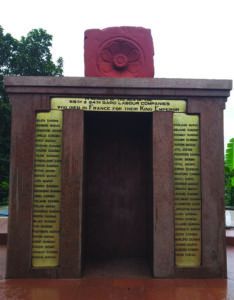Eleanor Sangma
They are certainly history’s ‘abandoned ones’! Taking a cue from the French writer, Albert Camus’ observation about ‘history being written by those who make history and not by those who suffer history’, it can be said for these one hundred and twenty Garo men who returned tired and fatigued and the rest who perished that they are among history’s ‘famous misses.’ Being part of a war which they were not responsible for, they did as best as they could to carry out their tasks and survive the difficult situations they found themselves in, in alien lands and unfamiliar and hostile surroundings.
The textbooks make no mention of the Garos during World War I, but they did have a role to play in the great war along with other states of North East India.
The World War I started in 1914 and lasted till 1918, with Europe at the centre of it. It eventually spread to other countries of the world, including India which was still under the British rule. The British government appealed to all the regions and tribes of India to help them fight in the war in any and all capacity. They were offered material and monetary compensations and exempted from paying house tax.
Historian and ex- Vice Chancellor of NEHU (Tura), Dr. Milton Sangma, stated: “Initially, Garo labourers were promised that they would not be required to work at the forefront of the battlefield.”

Babupara, Tura
However, after reaching France, those promises became mere, empty words due to unforeseen situations.
Garos had their own reservations regarding the situation. In order to protect their own, they wished for the government to leave some men in the villages. Sangma quoted an old Garo man in his book The First World War and the Garo Labour Corps saying, “We would not mind a bit if before taking men Government would look at our village, determine how many were necessary to cultivate, and leave us enough to cultivate the land and look after the cattle.”
More than one thousand men in total were recruited in 1917 from three centres which were at Damra, Baghmara and Tura.
Misfortune greeted the men at the gates of Tura and followed them on their journey to France. Due to communication gaps and uncertainty regarding the safety of the people, they had to camp in Tura for a few months. While waiting for their movement orders, many of them fell ill due to sores, skin diseases, dysentery and other diseases leaving them unfit to travel any further. Some of the men who were deemed fit died in the journey to France through the seas with only 456 men reportedly arriving at the town of Marseilles on the 19th of October, 1917.
Virtually blind to the harsh realities of war, the 69th Garo Labour Corps enjoyed their journey towards the battle lines near Beaucourt village. They were happy, witnessing the beauty of the world outside Garo Hills for the first time. In a letter, the labourers wrote, “…when we arrived at the battle fronts, we were depressed to see the deserted villages, dilapidated buildings and villages without any civilians.” The Garos lived there in the absence of light, with only the sounds of cannons and constant fear for company. After having quickly adapted to their living conditions, they were tasked with loading and unloading wood logs and wooden planks. They were disappointed with the broken promises of keeping them away from battle field. However, the Garos did find happiness is small things while they were there, such as the fruit gardens and pear plantations in the areas.
After being moved to the city of Peronne, they were tasked with more intensive labour. Some of them had to load and unload food and other essentials, while others had to dig trenches in the battlefields. While the two power blocs fought each other, Garos found their biggest enemy in the cold weather. They were not used to the snow, and were lacking warm clothes. Some would collapse while working, while one even died due to the cold.
As the war intensified, Garos laboured endlessly through unfamiliarly harsh weather conditions.
Sangma said, “Sometimes they had to dig trenches from 5 A.M to 7 P.M and supply essentials to the frontline the whole day.” After having stayed there for a few months, many of them felt homesick.
They missed their family, and no amount of clothes could warm them up. Despite such hardships, Garos pushed through and did what they went there to do. The historian quoted a British Commander saying, “They have determination. They’re loyal to their own King.” They received recognition and appreciation from the officials for their hard work.
The Garo labour force finally reached home on 16 th July, 1918, with 120 men arriving in Tura while others scattered in different places. A cenotaph has been erected in remembrance of those who died with inscriptions of their names. In order to celebrate the safe return of the 69th Garo Labour Corps and as a mark of respect for ones who gave their lives, Garo Labour Corps Day is observed on this day since 1919.
Sangma summed it up when he said, “This valiant deed of the Garos should be taught in schools. It marks the participation of Garos in world politics.” In the worldwide struggle between the Allied Powers and the Central Powers, the hill tribe also played a part. “It is an important contribution of the Garos to the world,” he added.



